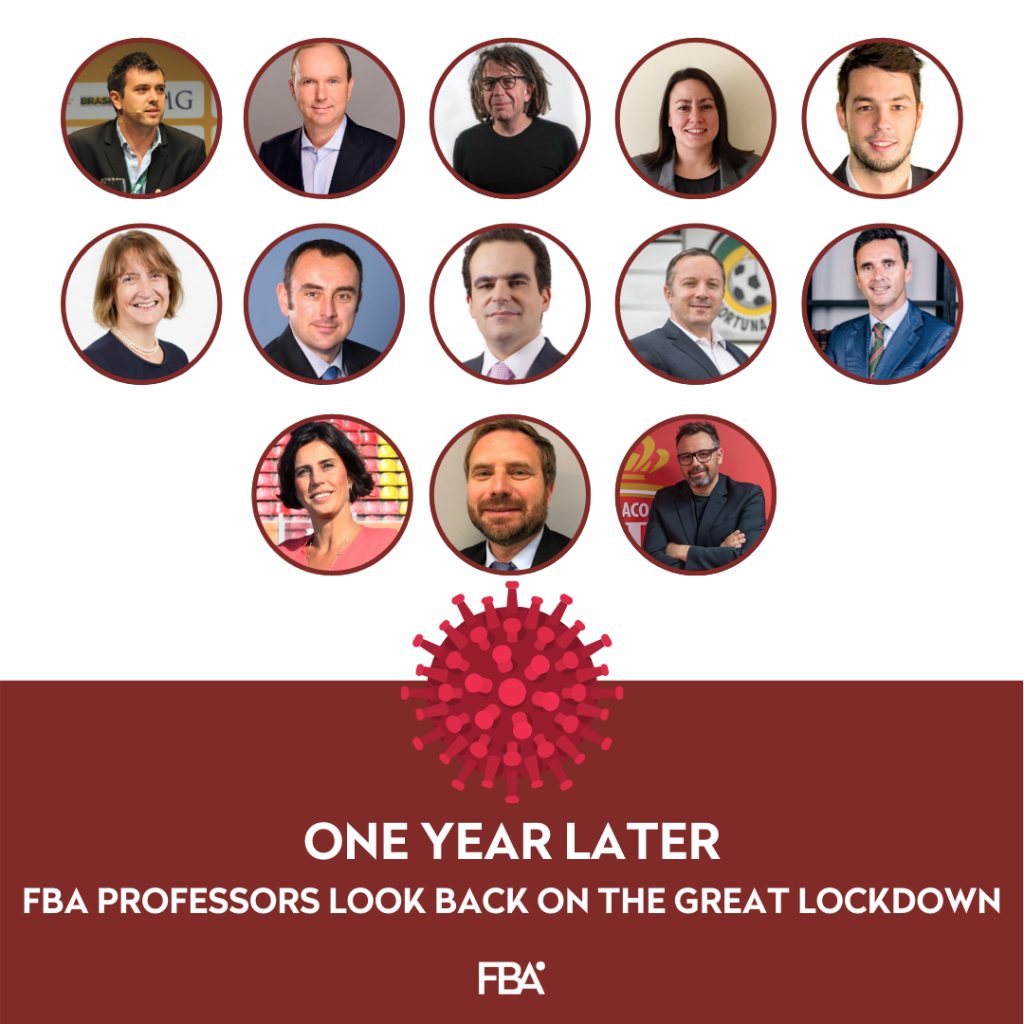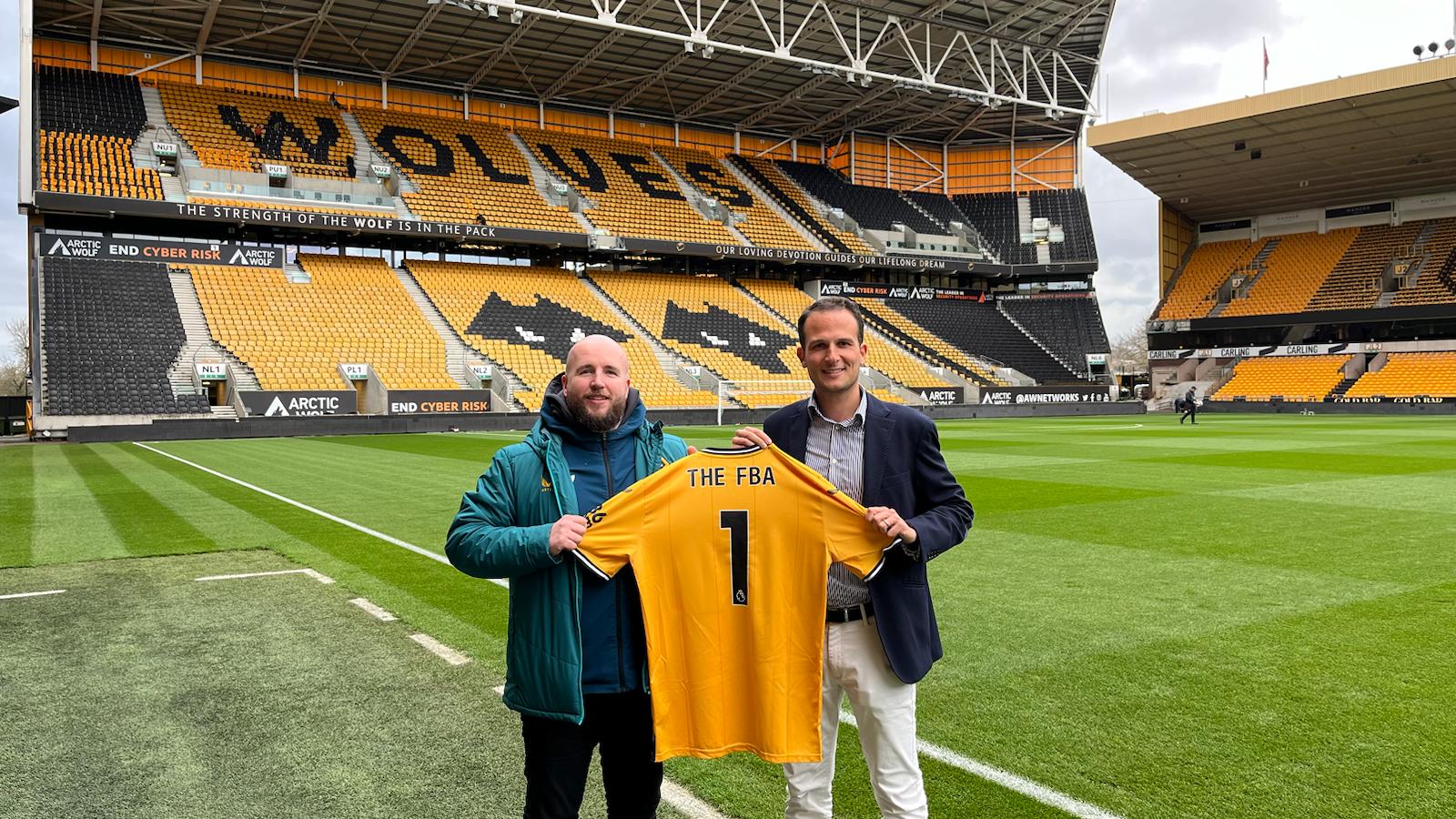To commemorate the 1 year “anniversary” of the COVID-19 lockdown around the world, we asked our Professors – who are at the very heart of the global football industry – to look back at this period and share their experiences and observations. By sharing the positives, the negatives, the lessons learned, the warning signs, and of course the opportunities, it provides current and aspiring football business professionals alike with a comprehensive overview of how the industry has been coping, and what lies ahead.
Daniel Wood – Entrepreneurship & Innovation:
What an exciting 12 months it has been for the evolution of Football. The importance of good communication and integrity has never been highlighted so much. I have seen an enormous boom in start-ups throughout the industry and the need for quick solutions has driven the spotlight onto some fantastic fan engagement and broadcast innovations. The environment has definitely benefited too, as we have all saved time and money by connecting up through video meetings worldwide (finally!!).
Vulnerabilities have been exposed in every corner and level of the game, which in turn reveals incredible opportunities for individuals with new ideas, seeking to carve out their journey through the Football Industry.
Smart investors will continue to look further away from the more traditional rights packages and towards solutions that can evolve and adapt with rapidly changing consumer needs, as well as having a positive impact in the world.
Alexey Kirichek – Fan Engagement:
Football Clubs, National, and International Federations and other entities around the football business lost direct income from fans: matchday, merchandising, hospitality, stadium catering, etc. But fans lost even more. They lost vital opportunities for social and natural stadium communication with their teams and idols. And most importantly, the live emotions of unpredictable football matches have gone from their everyday lives.
Clubs have attempted to set new forms and standards of fan engagement through various offline initiatives, which clubs will moderate after the pandemic. Some clubs even got new fans due to the pandemic (for example, FC Isloch from Belarus got international exposure as matches in the country have not been stopped during the first wave in Spring 2020).
However, most of us are waiting for the chance to return to the stadiums. A football match without supporters is not a full-fledged spectacle either for fans or for football players. According to the latest research, more than 50% of fans are ready to return to the stadiums immediately as they open doors.
The people returning to the stadiums will be an indicator that we are gradually defeating COVID-19. Full stadiums will mean that live football performance is an essential cultural and social phenomenon. And the practice of visiting matches remains with us while other habits have changed during the pandemic.
Markus Bartosch – Media & Communications:
Since COVID-19 struck the football world, media rights revenues have, in some cases, suffered minor and in other cases major hits. As revenues in this area also depend a lot on timing, some rights, having been sold shortly before the crisis, could sometimes escape immediate effects.
However, as the case of Ligue 1 in France shows, a good deal agreed before the crisis does not necessarily protect you from drops in revenues when your partner sees no opportunity to recoup his investment. A different case was the domestic rights tender of the Bundesliga last year. Getting caught up with the bidding deadline right in the outbreak of the pandemic, finally left them – for the first time – with a small decrease and not the usual growth for their domestic revenues from next year onwards. Also, the expectations for international media rights revenues for the big European leagues appear rather cloudy as competition and budgets in some markets have fallen.
On the other hand, there always has been light at the end of the tunnel as the entry of Amazon in the UEFA Champions League in Germany and Italy and the cooperation with La Liga in the UK shows. So, the overall mega trend of live football being one of THE top contents in an ever more digitalized world is still alive.
Nicole Allison – Women’s Football Development:
At the beginning of April 2020, I wrote an article about the opportunity for women’s football, despite the inevitable financial impact of the pandemic on the football industry. FIFA committed to the $1bn funding it had guaranteed for the women’s game for 2019-2022 and despite widespread fear of many teams folding under financial pressure, women’s football transfer spending surpassed $1m for the first time in 2020. We have seen a year-on-year increase of nearly 500% for domestic NWSL TV audiences, new media broadcasters coming into the mix, such as ATA Media, the Brazilian women’s national team securing equal pay rights and USWNT superstars joining England’s top English WSL teams, extending reach and interest in the women’s game all over the world.
That said, the lack of fans in our stadiums will have a lasting impact on the game. Habits have changed, and we cannot simply assume fans will return to stadiums to their pre-pandemic levels. Women’s football clubs have an opportunity to engage new fans, and importantly, need to work hard to re-engage those fans that were loyal attendees 12 months ago.
Alfonso Roberes – Sponsorships & Partnerships, Internationalization of Football:
The effects of COVID-19 on the worldwide economies have been huge and it seems that with the vaccines and reduction of the number of infected people, the world is coming (slowly) back to normality. The Sports Industry and more in concrete Football has been affected in general too because the revenues went dramatically down: no match day revenues, decrease of the TV rights and commercial incomes. The biggest commercial revenues of the clubs are the sponsorship deals and these ones also have suffered the consequences of the pandemic, where the companies sponsoring clubs had to change the way of activating the agreements, with more focus on digital platforms and match day branding on the LED or DBR (Digital Billboards Replacement) platforms and players branded contents.
The digital transformation of clubs and sponsors has been improved a lot because of COVID-19 and new trends, so those clubs better adapted will take the lead. The impossibility to attend matches, live unique PR experiences with club football players and attend other sport events are some of the assets that are under discussions between sport properties and sponsors to be compensated for next seasons when the situation will allow to do them.
Isitan Gun – Financial Strategy in Football:
The impact of the pandemic on football finances has been very significant across the leagues. On one side the clubs lost their matchday revenues since physical attendance to football matches has become impossible, on the other hand in several countries the broadcasters had to reduce or delay their payments to clubs. Sponsors have become more cautious and conservative. All in all, it’s become more difficult to plan for the future due to increased uncertainty.
Moreover, many lower leagues and youth academy practices/matches have been practically frozen for a long time now, which will have a disruptive effect on the football pyramid and the development trajectory of young football players.
The “new normal” that the football world is trying to adapt to can be characterized with deflated player wages and transfer fees as a direct result of reduced revenue streams for clubs. While this is a very difficult time for a football CFO, I believe that once the pandemic is largely over, it will help the football world be in a more resilient, less fragile, and potentially a bit more financially conservative state.
Alexandre Mestre – Law in Football, Ethics & Professionalism:
As a result of the suspension of various championships, some contracts expired before the new competition end dates, which, in some circumstances, led to the renegotiation of contracts, on the grounds of change of circumstances. In other cases, the legislation specifically adopted by States led to a partial salary reduction. There were also cases in which players were unable to comply with their legal and contractual obligation to appear for training and at games. FIFA has adopted Guidelines, which respect the parties’ contractual freedom, national employment legislation and the powers of national health authorities, which have helped the creation of a unified approach by clubs, players and football authorities, which has been positive, namely for Ethics in football. COVID-19 was also one of the reasons for the recent positive alterations of the FIFA RSTP, UEFA Financial Fair Play Regulations. It also highlighted the importance of the wording of the clauses in the sports employment contracts as well as the need to include pandemics as a ground for the declaration of force majeure.
Jane Purdon – Football Governance:
Important trends and developments include the CAS decision in the Manchester City FFP case. Once we are back in more normal times, UEFA may have some thinking to do about what the future of the FFP regime will look like. Elsewhere, the future structure of international club competitions continues to be a contentious area with various proposals from FIFA, UEFA, and the biggest clubs all on the table. And whether driven by the need for cash because the impact of COVID-19, or the need for expertise (for example in selling rights digitally), many clubs and leagues are looking hard at the possibilities offered by private equity investment.
The diversity of football continues to be an important topic. Some organisations have shown real commitment to increase gender and ethnic diversity in their leadership, but far more need to match their work. And as women’s football grows, many are beginning to question whether its governance should simply follow the model of men’s football, or whether there is an opportunity to create a governance framework that is different and, arguably, better.
Paul Mace – Media & Communications:
COVID-19 has sparked one of the greatest public relations challenges faced by the football industry in the modern era. Governing bodies, clubs, players and officials have all had to adapt and formulate strategies to maintain and strengthen relationships with supporters, investors and stakeholders. Above all else, the pandemic has seen the importance of football to its local communities highlighted like seldom before. Football has become one of the constants in society and there are numerous examples of how clubs and players have undertaken charitable and community initiatives to keep the spirits of the local community raised as best as is possible in troubled times.
Cyril De Greve – Stadium Operations:
The impact of COVID-19 was extremely visible within stadium operations, with stadiums being closed or only opened for a very small capacity. Quite soon, focus went towards a (partial) reopening of stadiums and alternative ways to interact with fans. We’ve seen various initiatives, both online and offline to engage with the fanbase. Multiple of these initiatives and investments will stay relevant after the COVID-19 crisis.
A similar finding can be seen in terms of technology. In a first instance it was about specific measures to combat the virus, now focus has gone to investments that will stay relevant after the crisis: enhanced crowd management, enhanced customer experience and digital innovation.
Overall, our industry showed its capacity to adapt in such a short notice and does everything to welcome fans back in a safe way. Exciting tests are being launched all over Europe, so we’ll follow these pilots closely.
Markus Breglec – Marketing, Media & Digital Transformation:
For all clubs in world football the pandemic will have had a significant impact. On the outset it was clear that this was a time to focus and support in solidarity those that helped hold up the system in general, maneuver the club through the first months of the unknown and manage through the immediate crisis. In France, this was then amplified by the league’s decision to cancel the 19/20 season early and then later by the negative impact of the broadcast partner change in Ligue 1.
At the same time, as a club we decided to use this time as a real re-set opportunity and looked at every part of the club on-and off the pitch to build a new future focused strategy that will guide the club through the next 4 years. We are seeing first good results of this strategic re-set as a club with exciting chapters in the pipeline, at the same time we are conscious that the long-term effects of the pandemic will be something that we will have to continue managing.
David Goldblatt – History of Football, Political Economy of Football:
My own take on the lessons of COVID-19 for football is take the science seriously, assume the worst can happen, and do something about that prospect now. Applied to the issue of the climate emergency, this would mean football leaking immediate and massive efforts to reduce its carbon footprint and set a catalytic example for the rest of society.
It is hardly a silver lining, but the pandemic has seen the carbon footprint of the global football industry shrink significantly. This is not surprising, given that around sixty to seventy percent of the industry’s carbon is produced by spectator travel, and spectator numbers have fallen so sharply, but it is not sustainable. As the dismal charade of games played in empty stadiums along with AI crowd noises shows, the presence of crowds is central to the sport’s cultural meanings and commercial success.
So, as the crowds come back, football needs to shrink its carbon footprint again. Despite the pressures and distractions of the pandemic, the climate change issue in football has received more prominence, and progress continues to be made: UEFA have committed to a carbon zero Euro2024: Forest Green Rovers got planning permission for their carbon zero wooden stadium; German fans have been calling for environmental reform in the Bundesliga; Arsenal, Southampton, Tottenham and Liverpool all signed up to the UN Sport for Climate Action Framework. All of which is good news, but we have a very long way to go.
This year’s UN COP 26 conference, of which the Sport for Climate Action framework will be a part, offers an opportunity for sport, in general, and football, in particular, to take the kind of decisive, rapid action that everyone must take if we are to tackle the climate emergency. This includes, amongst other things; a commitment to a carbon zero industry by 2030; offsetting of all carbon emissions from football related transport; an end to fossil fuel sponsorship; carbon audits and carbon reduction targets as a precondition for participation in tournaments and leagues; financial transfers to the global south and grassroots football to support carbon zero policies.
Ebru Koksal – Leadership in Football:
This period gave all the stakeholders the chance to notice how vastly interdependent yet so disconnected the football ecosystem is and to re-evaluate and remember what the pure essence of it was before it became more about content, mega events, creating value for sponsors & shareholders and generating higher returns on investments. The most beloved game’s purpose is not to only win games and provide entertainment, it has a social purpose beyond the competitive and financial pressures: a force for good that connects people regardless of race, social or economic status, symbolizes solidarity, fairness, diversity & inclusion, health & well-being, human rights and sustainability. Leaders must remember that solutions and recovery should involve all stakeholders and the aim should not be to recover or rebuild what we had, but rather build something much better altogether for “A Mindshift for Purposeful Wealth & Power Re-Balancing”.
Closing Remarks:
It’s clear that all the areas of the football industry have been severely impacted by the COVID-19 pandemic and the resulting lockdowns, and that it has forced football’s stakeholders to adapt and rethink their strategies and business models.
The spirit of solidarity has always existed in football, and the past 12 months have highlighted the fact that everyone in this industry must continue working more closely together to not only bring back normality to the world of football, but also to ensure harmony across the spectrum of stakeholders large and small for the years ahead.
We would like to give special thanks to all of The FBA Professors for sharing their valuable insights and we hope that the football community will recover from the Great Lockdown in ways that will allow football fans to fall in love with the beautiful game again when they return safely to the stadiums.
About The Football Business Academy Master Degree in Football Business
The Football Business Academy is a Swiss-based high level international educational institution whose goal is to professionalize the management of the football industry and facilitate the insertion of qualified professionals and future leaders in the game. Its flagship program, a Professional Master in Football Business, was codeveloped with international football industry experts from around the world around one foremost objective: to provide Candidates with all the necessary tools and an optimal learning environment in order to succeed in this passionate and dynamic industry.





